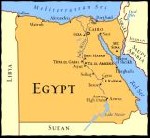 Almotamar.net Google News
Almotamar.net Google News - Those talking about "reforms" in the Arab world usually mean freedom of opinion and more citizen involvement in public decision-making processes. So what is happening in Egypt at the moment seems all the more curious.
President Hosny Mubarak and his National Democratic Party (NDP) have drawn up comprehensive constitutional reforms, on which Egyptians are due to vote on Monday. It sounds like democracy and progress - but the opposition doesn't like it.
They think it's a sham - "reforms" on the outside, but inside there is more power for the president and the police and less room for manoeuvre for the opposition.
Even the fact that the electorate itself is to vote on the reforms at the polls is not enough to console the opposition.
Independent observers think that the majority of Egyptians have not even understood what the reforms are all about. After all, they were only given their blessing by parliament last Monday.
The opposition claims that the government deliberately moved the referendum forward twice, and that they scheduled it to take place only a week after it was passed in parliament because the NDP wanted to see the reforms rubber-stamped before the public understood what it had actually agreed to.
The argument between the governing party and the opposition is mainly about the ban of religiously-motivated parties, the obstacles to independent candidates in presidential elections and a weakening of the judicial system.
According to the draft constitution, the president would be given the right to decide whether a civilian would be tried before a civil court or a military court. Moreover, the police would be allowed to search houses and make arrests without a judicial warrant.
The new constitution would also reduce the judicial monitoring of elections, after several judges complained about fraud during the last presidential and parliamentary elections.
The NDP, which holds the parliamentary majority, also plans to replace several outdated sections of the old constitution.
But, say its critics, Mubarak's party first and foremost pursues three different aims: to strengthen the executive, to bar the Muslim Brotherhood (MB) from rising to power through elections, and to show the government in a positive light as the initiators of "reform."
The international human rights organization Amnesty International denounces the constitutional reforms as "the most serious undermining of human rights safeguards in Egypt since the state of emergency was reimposed in 1981."
The US State Department also showed concern and emphasized that the Egyptian citizens had to be "well informed before making a decision."
Parts of the opposition meanwhile are calling for a boycott.
"Boycott the referendum," the left-leaning Cairo weekly Al-Ahali titled on Wednesday. In a leader, the paper predicted a dark future for the Land of the Pharaohs: "Egypt has lost its brilliance amidst the fascism of the Muslim Brotherhood and the arbitrary rule of the NDP."

